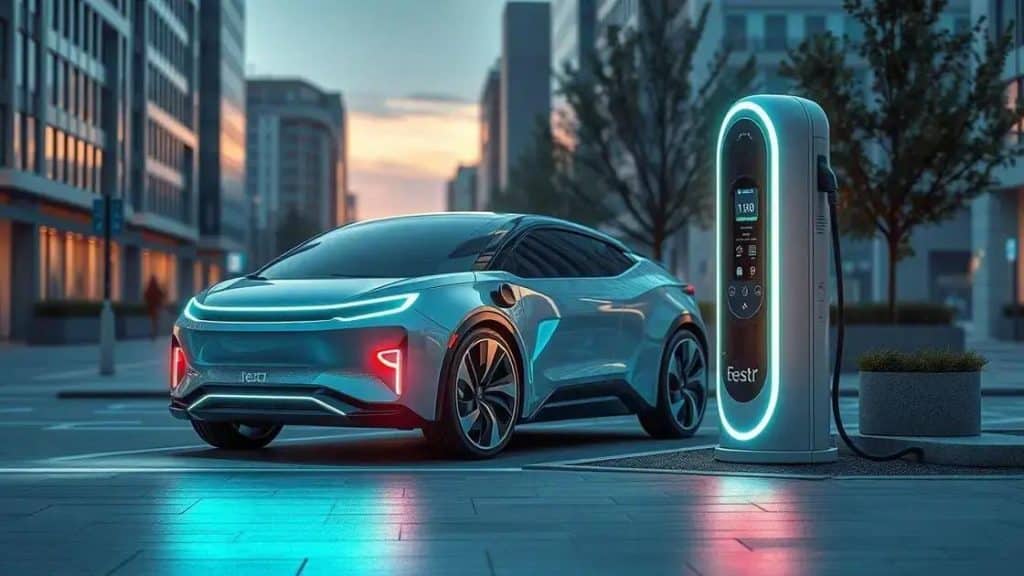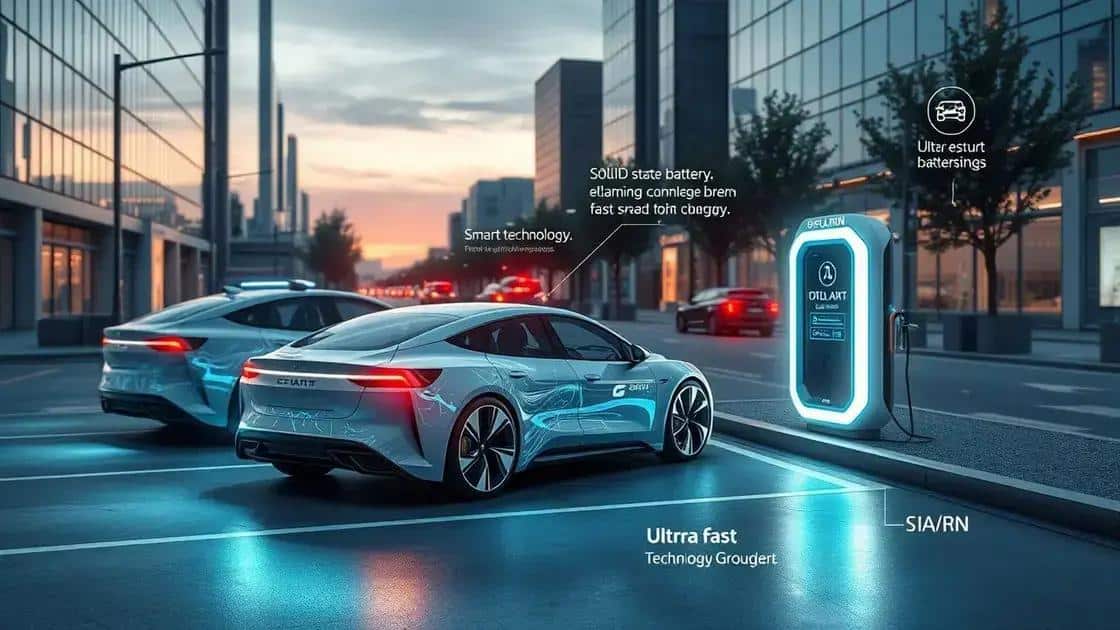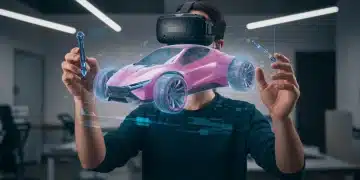Insights on electric vehicle news: what you need to know

Insights on electric vehicle news highlight advancements such as solid-state batteries, improved charging solutions, and vehicle-to-grid technology, all aimed at enhancing performance and promoting wider adoption.
Insights on electric vehicle news can help you navigate the fast-changing landscape of sustainable transportation. Are you curious about the latest developments? Let’s dive into what’s happening now!
Latest trends in electric vehicles
The latest trends in electric vehicles reveal exciting changes in technology, design, and consumer preferences. As more people seek sustainable options, the electric vehicle market continues to evolve rapidly. In this section, we will explore some key developments that are shaping the future of transportation.
Emerging Technologies
New technologies are enhancing the performance of electric vehicles, making them more appealing to consumers. Innovations such as improved battery efficiency and fast-charging solutions are becoming more common. These advancements allow electric vehicles to travel longer distances and recharge quickly, addressing the range anxiety many potential buyers feel.
Increased Variety
Automakers are now offering a wider variety of electric vehicle models. Consumers can choose from compact cars to SUVs, ensuring there is an option for every lifestyle. This increased variety boosts consumer interest in electric vehicles and expands their market reach.
- Compact electric vehicles are perfect for city driving.
- SUVs offer more space and are family-friendly.
- Luxury electric models are on the rise, attracting high-end buyers.
Furthermore, as governments worldwide implement stricter emissions regulations, car manufacturers are pressured to innovate continually. This competitive environment drives advancements in electric vehicle design and efficiency, contributing to a more sustainable future. Educational campaigns also play an essential role. They highlight the benefits of electric vehicles, making it easier for consumers to understand their options.
Consumer Preferences
Current consumers increasingly favor electric vehicles due to their efficiency and environmental benefits. Many prefer brands that support sustainability and offer eco-friendly products. As public awareness grows, manufacturers are adjusting their marketing strategies to highlight not just the performance of their electric vehicles but also their environmental impact.
With a focus on reducing carbon footprints, the electric vehicle industry is witnessing a shift towards more sustainable materials in production. Innovations such as recycled materials for vehicle interiors help appeal to environmentally conscious consumers further. This trend is likely to continue as the industry strives to minimize its impact on the planet.
In conclusion, the latest trends in electric vehicles indicate a move towards greater efficiency, variety, and consumer awareness. These developments signal a bright future for sustainable transportation and a shift in how we think about driving.
Top electric vehicle manufacturers

When discussing the top electric vehicle manufacturers, it’s essential to highlight companies that are leading the way in innovation and sustainability. These manufacturers not only produce electric vehicles but also play a significant role in advancing the technology behind them. Let’s take a look at some of the most influential players in the industry.
Tesla
Founded by Elon Musk, Tesla has revolutionized the electric vehicle market. Their Model S and Model 3 have set benchmarks for performance and safety standards. Tesla’s commitment to continuous improvement through software updates enhances the driving experience.
Volkswagen
Volkswagen is investing heavily in electric vehicle development through its ID series. The company aims to become a leader in the EV market, offering a range of models designed for different consumer needs. The ID.4 SUV is a popular choice, emphasizing both style and functionality.
Ford
With the launch of the Ford Mustang Mach-E, Ford has entered the electric vehicle race aggressively. They are committed to producing a variety of electric vehicles, catering to both performance enthusiasts and family-friendly models. The automaker has pledged significant investments in EV infrastructure.
General Motors
General Motors has launched its Chevrolet Bolt, a compact electric car that offers impressive range and affordability. GM is committed to an all-electric future, planning to introduce more electric models in various segments.
- Tesla: Known for high performance and extensive range.
- Volkswagen: Focused on affordability and sustainability.
- Ford: Blending classic performance with modern EV technology.
- General Motors: Diversifying its offerings to reach different markets.
As these top manufacturers evolve, their strategies reflect a balance between consumer needs and environmental considerations. The electric vehicle market is increasingly competitive, with companies realizing the importance of environmentally friendly practices. This shift influences production methods, rewarding manufacturers who prioritize sustainability. With advancements in technology and increased demand for electric vehicles, we can expect continued growth in this sector.
Challenges facing electric vehicle adoption
One of the significant challenges facing electric vehicle adoption is the availability of charging infrastructure. While many urban areas have invested in charging stations, rural regions still lag behind. This lack of accessibility creates concerns for potential buyers. Moreover, the convenience of charging needs to match that of refueling traditional vehicles to ease consumer hesitation.
Battery Costs
Another hurdle is the cost of electric vehicle batteries. While prices have decreased over the years, they still represent a significant portion of the vehicle’s total cost. Manufacturers are working to find ways to lower these expenses. Innovations in battery technology could lead to more affordable pricing for consumers.
Range Anxiety
Range anxiety is a well-known term in the electric vehicle community, referring to the fear that a vehicle will run out of charge before reaching a destination. Although many modern electric vehicles provide sufficient range for daily commutes, consumers still need reassurance, particularly for long trips. Automakers are addressing this concern by improving battery capacity and expanding charging networks.
- Insufficient charging stations can deter potential buyers.
- High battery costs can make electric vehicles less accessible.
- Range anxiety remains a common fear among consumers.
- Education and incentives are necessary to promote electric vehicles.
Additionally, consumer awareness plays a crucial role in electric vehicle adoption. Many individuals are still unfamiliar with the benefits of electric vehicles, which can hinder their willingness to switch from traditional fuel cars. Ongoing education campaigns can help inform the public about environmental benefits and reduce misconceptions about electric vehicles.
Finally, government policies influence electric vehicle adoption significantly. Incentives such as tax credits or rebates can boost sales, but the absence of such support can stall growth. A consistent policy approach is vital for encouraging both manufacturers and consumers to embrace electric vehicles.
Future innovations in electric vehicle technology

The future innovations in electric vehicle technology promise exciting advancements that will transform the driving experience. As research and development continue, several key areas are gaining attention, and they could make electric vehicles more appealing and efficient.
Solid-State Batteries
One of the most anticipated breakthroughs is the development of solid-state batteries. Unlike traditional lithium-ion batteries, solid-state batteries offer greater energy density, which means vehicles can travel further on a single charge. Additionally, they are safer and have shorter charging times, making them highly desirable for consumers.
Improved Charging Solutions
Next, charging infrastructure is evolving. Innovations such as ultra-fast charging stations will allow drivers to recharge their vehicles in less time than it takes to fill a gas tank. With expanding networks of charging stations that can deliver higher power, range anxiety will diminish, encouraging more people to choose electric.
Vehicle-to-Grid Technology
Another exciting innovation is vehicle-to-grid technology. This allows electric vehicles to send stored energy back to the grid during peak demand. It creates a two-way relationship where electric vehicles can help stabilize energy costs, making it beneficial for both drivers and energy providers.
- Solid-state batteries could increase range and safety.
- Ultra-fast charging will reduce wait times for drivers.
- Vehicle-to-grid technology may enhance energy efficiency.
- Smart technologies will enable better integrations with home energy systems.
Finally, the integration of smart technology is on the rise. Electric vehicles may soon come equipped with advanced driver-assistance systems, enhancing safety and convenience. Features like self-parking, adaptive cruise control, and real-time traffic updates will offer an improved driving experience.
As these advancements unfold, the electric vehicle industry is poised for significant growth. With innovations focused on performance, convenience, and sustainability, the future of electric vehicles looks incredibly promising.
FAQ – Frequently Asked Questions about Electric Vehicles
What are the main advantages of electric vehicles?
Electric vehicles offer lower emissions, reduced fuel costs, and often require less maintenance than traditional gas vehicles.
How do solid-state batteries improve electric vehicle performance?
Solid-state batteries provide higher energy density, leading to longer ranges and shorter charging times, making electric vehicles more practical.
What is vehicle-to-grid technology?
Vehicle-to-grid technology allows electric vehicles to supply energy back to the grid, helping to balance supply and demand while providing cost benefits to owners.
How can I find charging stations for electric vehicles?
You can find charging stations using mobile apps like PlugShare or ChargePoint, which map out available charging locations based on your journey.





